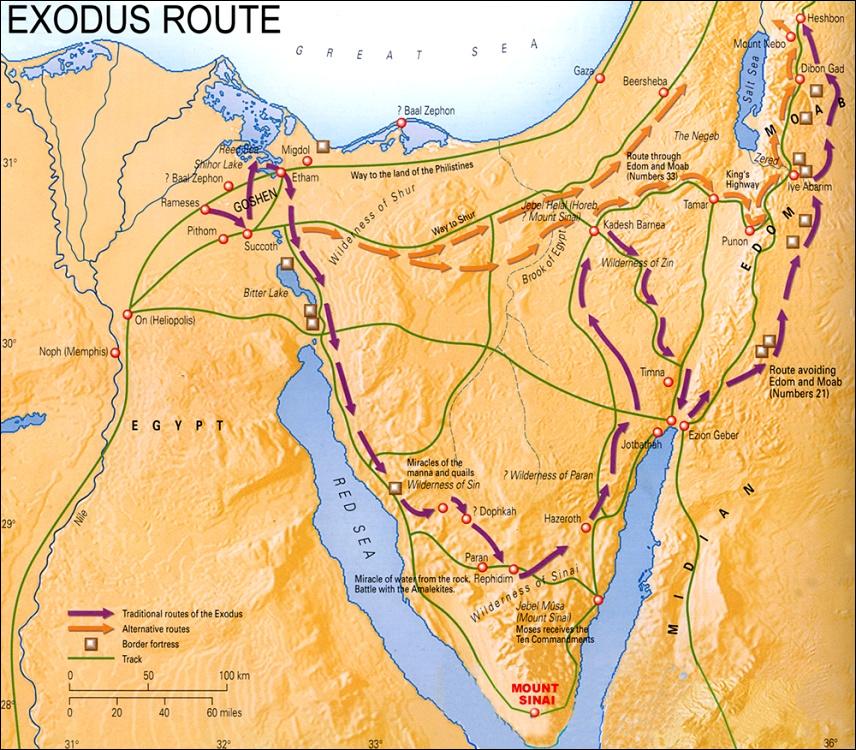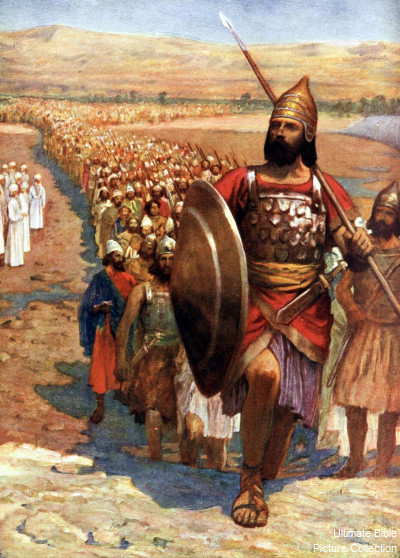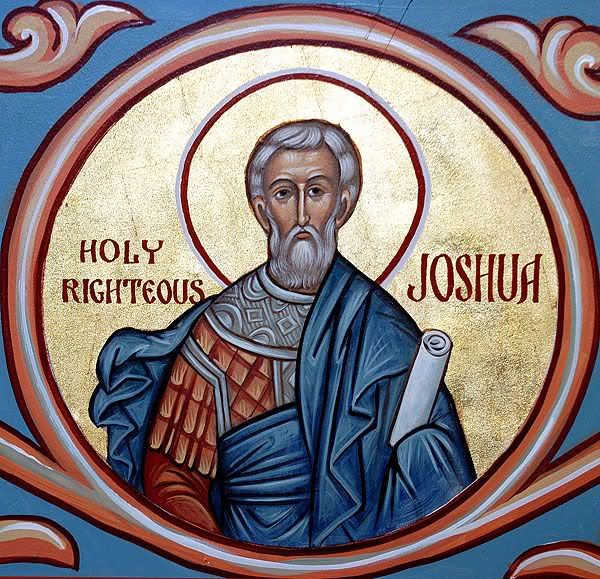Showing posts with label Wilderness. Show all posts
Showing posts with label Wilderness. Show all posts
Sunday, 28 July 2013
Why Was God So Hard On Moses?
Posted by
Supertradmum
One of the great questions coming out of a reading of Deuteronomy may be asking why God did not let Moses go into the Promised Land? After all, Moses was the great friend of God's, the holiest man alive, and a great leader of God's People.
OK, so he struck the rock more than once...but was the sin merely impatience, or anger? Moses was instructed to speak to the rock and, instead, he hit it twice.
Some commentators say that Moses made himself equal to God by referring to "We" providing the water.
Some commentators state that it was because Moses was disobedient and did not follow God's directions exactly, which Moses obviously did not do.
I think it was impatience. Why is impatience such a serious sin? Impatience is not trusting in God.
After all those years, of intimacy with God, something in Moses still did not trust God enough to wait, wait on the words spoken to the rock for water.
Anger is not trusting in God. Anger is playing God-"I want this, now!" A lack of trust is a lack of love. At that moment, Moses simply did not love God enough to trust in Him.
But, not to go into the Holy Land was a serious punishment.
Moses sinned in front of the entire people. His sin was not private, but public. He gave a bad example of one's relationship to God to the entire assembly of the tribes of Israel.
Moses was not perfect and this surprises us, as only the perfect see God. But, that is the analogy here. Moses, the Giver of the Law, did not enter the place of promise as he was not perfect.
Joshua and Caleb had pure hearts, as did those who were the children of the slaves of Egypt.
A new standard was necessary to enter, and conquer the Promised Land. That standard was purity of heart.
Even though Moses is one of the greatest men of the Old Testament, and represents the Law in the Transfiguration, as Elijah represents the Prophets, and Christ fulfilling the Law and the Prophets, still Moses sinned and was punished. His punishment, however, allowed him to be purified before death. How to we know that? Elijah did not die, but went up to heaven in the fiery chariot. Moses is said in all the commentaries to have died, but his state of perfection was such to allow him to be in heaven, so we see him in the glory of Christ in the Transfiguration. If Moses had been in Hades, in that upper chamber called the First Limbo, waiting for the Harrowing of Hell, he would not have appeared with Christ.
Only the pure enter heaven, and Moses' terrible punishment of not entering Canaan, made his heart pure.
May I add that in the Epistle of Jude, verse 9 notes that the Archangel Michael fought the devil over the body of Moses. This is a great line upon which to meditate and gives teeth to the idea that Moses, like Elijah, was in heaven body and soul.
9 But when the archangel Michael, contending with the devil, disputed about the body of Moses, he did not presume to pronounce a reviling judgment upon him, but said, “The Lord rebuke you."
Saturday, 27 July 2013
Wilderness Generation Two; Hope for The Future
Posted by
Supertradmum
For several weeks, I have been reading the Pentateuch, and meditating on the Hebrews long exile in the Wilderness.
I have commented on this here in what has become a popular post,
http://supertradmum-etheldredasplace.blogspot.ie/2013/07/the-purification-of-generation-of.html,
but would like to add to that comment in light of things which are happening so fast around us in Europe.
The sins of the Hebrews coming out of Egypt are not subtle, but the interior disposition which causes those sins are. I use the present tense, as these sins, both external and internal, plague us today.
Firstly, the sins were murmuring or continual complaining, a sign of ungratefulness; idolatry, which exploded in the creation of the golden calf and the destruction of two entire clans, caused by lust and a lack of patience; envy of Moses; and cowardice, as only Joshua and Caleb and their families entered the Promised Land.
One can see that externally, these sins differ but there is an interior disposition which causes all-murmuring, idolatry, envy, lust and cowardice.
This is the sin of self-love. Self-love causes one to rebel, deeply, against God and human authority.
Self-love destroys peace and the worship due to God.
Self-love falls into sensuality over and over, as the self becomes god.
Self-love deceives and stops the pursuit of self-knowledge.
God either makes us or allows us to wander until our senses and our spirits are purified. Only the perfect see God. Only the pure in heart went into the Promised Land.
Caleb and Joshua are two of my favourite Old Testament heroes. But, I tend to like the John Wayne men, such as David and the Maccabees.
It is interesting that some of the most numinous and direct revelations of God and His angels were given to Joshua and the Maccabees.
These men fought out of a purity of heart, which is difficult for modern men to grasp.
Caleb saw the tall and fit Canaanites, but was not afraid. His family were blessed by his faith.
In fact, he was rewarded with so much land, that he could give much to his daughter, which I shall write about later.
Joshua, Caleb, the Maccabees had to acquire a purity of heart, a death to self, in order to see God and His Hosts. How is it that they, among so many who had to die in the Wilderness as a punishment, could go on?
These men loved God more than themselves or their comfort. Simple, really.
David fell into sin, but after his repentance of adultery and murder, he came back to God more humble and with a purity of heart.
Purity of heart demands that one loves, focuses, follows all the ways of God.
Metaphorically, those who wandered in the Wilderness were wandering in their own souls. Until they were purged of self-love, they could not even see the Promised Land. It is interesting that God only chose those who could actually obey Him totally to continue into Canaan. Even Moses was denied entrance and could only look on what he worked so hard to attain. But, he had sinned, being impatience with God.
Obedience is a fruit of the pure in heart. Complaining means that one is playing God. Those who wander in the Wilderness are finally purified, but only so that they can pass their faith and humility on to their children. And, this is key. The younger generation never saw the works of God. They did not see the Passover, the Exodus, the Parting of the Red Sea. But, they heard of the wonders of God from their parents.
They did not see Moses going up on to Mt. Sinai, or coming down and destroying the idolators. They did not see the earthquake which swallowed up the sinful leaders. I merely paraphrase Deuteronomy here.
But, they were formed in the desert.
This gives me hope. Those in this and the next generation will be formed in deserts.
They will need the stories, the heritage of the Catholic Tribe to carry on in unmitigated faith.
The Wilderness experience created a generation of the pure in heart.
To be continued....
Friday, 19 July 2013
The Purification of A Generation of Children
Posted by
Supertradmum
One of my readers asked me why God did these two things: one, cause the Hebrews to wander in the Sinai wilderness for forty years. She thought that the adoration of the golden calf was dealt with at the foot of the mountain.
Two, she could not understand why the army of St. Joshua had to kill Canaanites. (Also connected to this, would be the slaughter of the Philistines by St. David.)
Good questions.
Yes, God did punish many of those who built the golden calf by death immediately when Moses came down from the mountain. However, the problem of the interior lives of the Hebrews required that there souls be purified. Of what? As I heard in a sermon long ago, the bodies of the Hebrews were freed from slavery in the Exodus, but their souls had to be freed from the slavery of sin and idolatry in the Wandering.
The hardest thing for some of the Israelites was that they had to adore the Unseen God. Although God spoke to Moses, His Voice was not heard by all. There was too much sin and corruption in the souls of the Hebrews blocking the Voice of God.
One can see that 40 years is a generation. All of those who came out of Egypt, barring a few, like Joshua and Caleb, were not allowed entrance into Canaan, not merely because of punishment for idolatry, but because they simply were not strong enough to conquer evil.
One cannot conquer evil outwardly if one has not conquered it inwardly. This is what purification is all about. As in the purification series here on this blog, the process of allowing God to get rid of all sin, the proclivity to sin and to be filled with the Holy Spirit is necessary not only for personal holiness, but for making the Church and the society holy.
Without personal holiness, the Church is weak. God had to purify His People. They were purified to the point where their children were being formed in God's ways from little on.
This is what we need to do now. Form our children from little on to be pure so that they can overcome evil. Evil will thrive and grow without the purity of St. Joshua.
Secondly, the Canaanites were bad news. I have studied their culture.They sacrificed babies, usually the first-born, to Moloch, and archaeologists have found clay jars with the skeletons of infants in them. They would roll these jars into the mouth of the furnaces of Moloch. They also put the bodies of sacrificed children under the foundations of houses. By the way, an old missionary priest friend of mine told me the Maoris did the same thing with the bodies of their slain enemies. His church was built over a Maori home and the remains were found under every one of the main four posts. The idea that the dead gave strength to a house and protected it is not confined to the Canaanites.
Joshua's name is the same as that of Jesus. The name means Saviour. and Joshua, like many other leaders in the Old Testament, is a type of Christ. He tell us something about Christ and points to Christ's winning the battle over evil and death. He is a type of Christ for leading the Israelites into the Promised Land, as Christ leads us to Heaven. But, not without spiritual warfare.
And Joshua had to fight against cannibals. I recommend reading the Book of Joshua.
But, the Book of Wisdom also refers to these bloody rituals.
1] O how good and sweet is thy spirit, O Lord, in all things! [2] And therefore thou chastisest them that err, by little and little: and admonishest them, and speakest to them, concerning the things wherein they offend: that leaving their wickedness, they may believe in thee, O Lord. [3] For those ancient inhabitants of thy holy land, whom thou didst abhor, [4] Because they did works hateful to thee by their sorceries, and wicked sacrifices, [5] And those merciless murderers of their own children, and eaters of men' s bowels, and devourers of blood from the midst of thy consecration, DR
The woman who asked the question could not understand offensive warfare dictated by God in the Old Testament.
For a context, many in 2013 have lost the idea of defense; that is, that in Catholic teaching, one may defend one's family, one's nation, and even one's property.
However, the offensive wars of the Old Testament, like the destruction of the five cities by God, two of which were Sodom and Gomorrah, are hard for modern Catholics to understand.
God called His People to a holiness and He called them to the Promised Land. His Will was to cleanse those lands of evil so that His People would thrive in holiness.
Christ does not call us to offensive war, except in prayer. Spiritual warfare needs spiritual weapons. However, we have a right to defend ourselves and a duty to defend those who are weak-children, women, the elderly.
As in The Mission, there are two ways to withstand evil. One is fighting, and one is witnessing peace. Both groups were right, but all but a few died.
Make pursuing the path to purification a priority in your lives. Teach your children and form them from the cradle. They shall see the age of the Canaanites. It is already upon us in some places.
Subscribe to:
Posts (Atom)



/images/scan0001.jpg)


